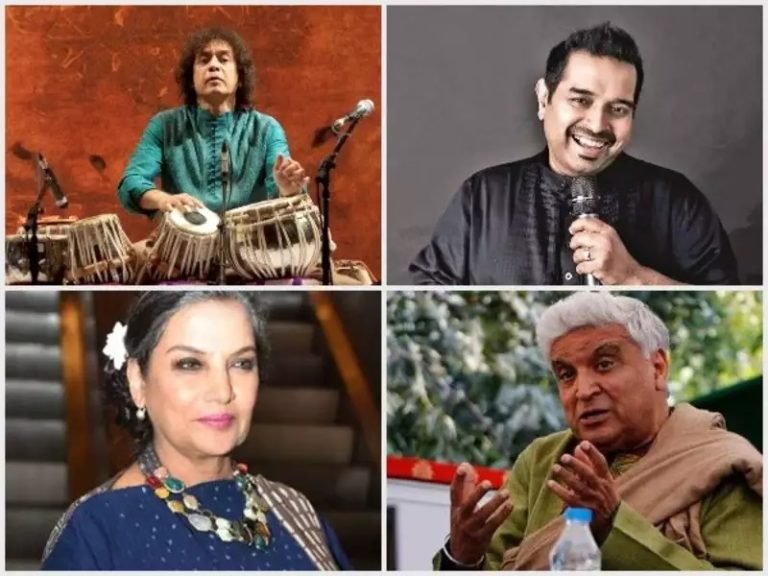In ‘A Musical Tribute to Kaifi Azmi’, Feroz Abbas Khans seeks to recreate new experiences instead of reinforcing older successful stereotypes.

Feroz Abbas Khan’s ‘A Musical Tribute to Kaifi Azmi: Raag Shayari’ produced to mark famous poet’s 100th birth anniversary is like double magic. The recreation of the magic of Kaifi’s poetry is packaged with the finesse of the ace director’s inimitable style.
The musical peeks selectively into Kaifi’s poetry written in an eventful life with its share of struggles and successes during eventful times. Son of a zamindar (landlord) in Uttar Pradesh’s Azamgarh, he started out as a gazal writer at the age of 11 and went on to pen poetry on issues of social justice, and romantic lyrics for films.
He gave up his studies during the Quit India movement in 1942, became a cardholder of Communist Party of India (CPI), joined Progressive Writers’ Movement of India, moved to Mumbai (the-then Bombay) at the age of 19 to work along with the likes of poet-lyricist Ali Sardar Jafri for CPI’s Urdu newspaper ‘Qaumi Jung’, and achieved success and fame in Hindi film industry.
Kaifi lived a celebrated life with his talented and less feted theatre and film actor wife Shaukat Azmi, surrounded by his cinematographer son Baba Azmi, film actress daughter Shabana Azmi and her lyricist and screenwriter husband Javed Akhtar.
The musical confines itself to Kaifi’s socially conscious poetry, boldly giving his romantic film lyrics a complete miss, and opens with his unforgettable voice and hypnotic delivery. Kaifi’s poetry is rendered bilingually by Shabana and Javed, sung by popular singer-composer Shankar Mahadevan accompanied by tabla virtuoso Zakir Hussain and sitar maestro Purbayan Chhatterjee. The individual performances are up to their respective high standards, and blending beautifully with good timing into a memorable production.
Reference to wife Showkat Azmi, now deceased, who was not only Kaifi’s wife but also a comrade-in-arms, is conspicuous by its absence.
About an hour long, the musical is timed to not only hold your attention, but also appetizing to prompt you to Google for more about Kaifi and his times.
In sync with the challenging times we live in, the musical happens to use for good measure even today’s prime-time keywords like zamindar (landlord) and kisan (farmer). Selection of poetry is through today’s prism rather than even Kaifi’s eyes of his own time. It does help that Kaifi is relevant today as ever.
The musical is a valuable addition to the body of work on Kaifi, including a documentary film (Kaifi Azmi), an audiobook (Kaifiyaat), a book (Aaj Ke Prashid Shayar: Kaifi Azmi), and plays (Kaifi Aur Main, Yadon Ki Rahguzar and Waqt Ne Kiya Kya Hasin Sitam).
In ‘A Musical Tribute to Kaifi Azmi’, Feroz Abbas Khans seeks to recreate new experiences instead of reinforcing older successful stereotypes. Taking the road less travelled, he bypasses the easy and popular way of riding on Kaifi’s immensely popular and evergreen film songs. He does not give in to temptations to ride on collateral advantages of using Azmi’s illustrious extended family either, but is quite focused on driving home Kaifi’s relevance today with the rockstar like presence of just two family members Shabana and Javed.
As usual, Feroz Abbas Khan is unputdownable. When his last performance still lingers on in memory, he outdoes himself with something completely different, creating new memories about known people or events, dressing them soul outwards in his own colours and fragrances but still faithful to the original.
When we thought he had found his niche with plays like Tumhari Amrita, he ventured into a movies like Gandhi My Father, Doordarshan serials like Main Kuch Bhi Kar Sakti Hoon, Broadway-style musical Mughal-e-Azam and now A Musical Tribute to Kaifi Azmi.
Feroz Abbas Khan is unafraid. He does not follow a formula, but a mother formula of good direction and innovation across mediums. Sometimes he weaves his production around a social message, too, as this time – and with success.
